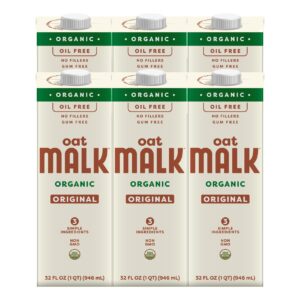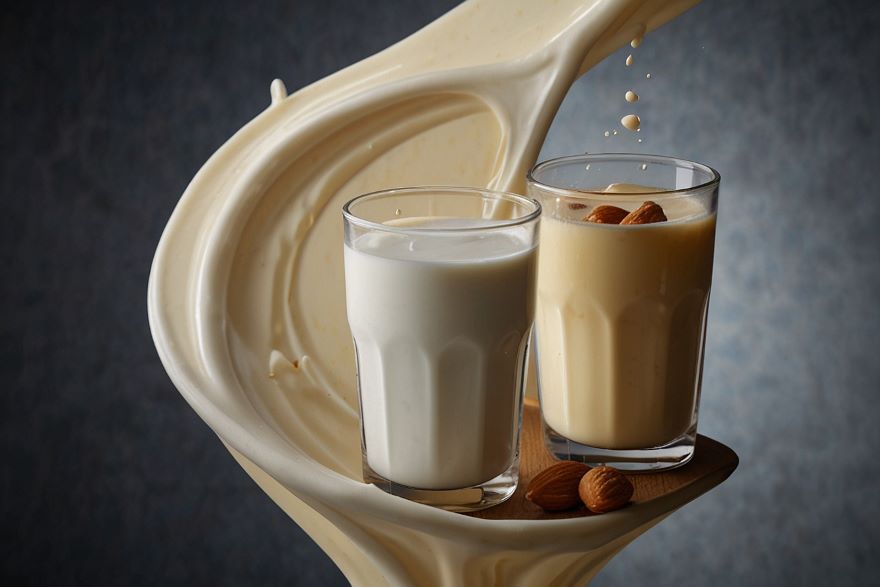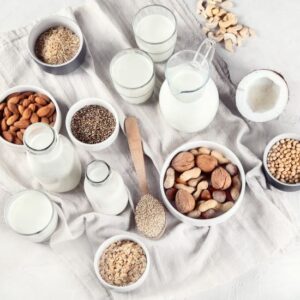Best Milk For Smoothies
I prioritize maintaining a healthy lifestyle. I always pay close attention to the ingredients I use in my cooking. When it comes to creating smoothies, the choice of milk can greatly influence both the flavor and overall quality.
There is such a variety of milk options nowadays. From rich dairy choices to lighter non-dairy alternatives. I have dedicated considerable time to researching and experimenting to discover the ideal match for tasty nutritious smoothies.
Smoothies offer a way to incorporate nutrients from fruits, vegetables, and superfoods by blending them. Adding some form of milk gives it that consistency as well. It’s something I absolutely love!
If you’re curious about the milk for smoothies, I’ve got you covered. In this piece, I will share my suggestions for milk to include in your blended drinks highlighting the advantages of each one. Whether you lean toward plant-based milk or lower-calorie options, there’s something for everyone. Let’s dive into my milk choices for a smoothie experience!
When selecting milk, for your smoothies there are factors to keep in mind:
1. Taste. Consider whether you prefer a flavor or something robust.
2. Texture. How creamy and thick do you want your smoothie to be?
3. Health benefits. Think about the value you’re looking for… whether it has added protein, fewer calories, extra calcium, etc.
4. Dietary restrictions. Remember to account for any allergies, intolerances, or dietary choices like veganism or vegetarianism.
Now let’s delve into some milk options that can elevate your smoothie game.
Plant-Based Milks
Almond Milk:
Almond milk blends seamlessly with ingredients in smoothies and brings a delightful nutty taste. It’s low in calories and sugar but high in protein making it ideal for weight management and muscle building. Additionally, it’s rich in vitamin E for cell health. It is suitable for those who are lactose intolerant or have digestive issues. Being low-carb also makes it compatible with keto or low-carb diets.
Coconut Milk:
For a creamy texture in your smoothie, coconut milk is a choice. The fats present in coconut milk contribute to the nature of the smoothie while keeping you feeling fuller for longer. Moreover, the medium chain triglycerides (MCTs) found in coconut milk offer an energy boost. Coconut milk contains a variety of vitamins and minerals such as potassium, magnesium, and calcium. It’s important to note that it is higher in calories and fat compared to plant-based milks.
Soy Milk:
Soy milk is an option for those who prefer plant-based protein. It is low in calories and sugar, and offers an amount of protein which can be beneficial for managing weight. The presence of isoflavones in soy may also contribute to reducing the risk of cancer and supporting bone health. Additionally, soy milk provides vitamin D and calcium.
Oat Milk:
Oat milk is vegan, gluten-free, and rich in fiber which helps you feel full longer after consuming it in your smoothie. It is fortified with nutrients like B12, calcium, and iron – making it an excellent choice for individuals with gluten sensitivities or celiac disease.

This has to be one of my favorites because it has very few ingredients. I am delighted by the flavor of the Malk Organic Original Oat Milk.
This oat milk is crafted using three ingredients; filtered water organic gluten free oats and Himalayan pink salt. It’s also devoid of seed oils gluten, glyphosates, gums, dairy and carrageenan catering well to individuals, with needs.
Cashew Milk:
Cashew milk boasts a texture with low-calorie content – perfect for adding to smoothies. The healthy fats found in cashew milk aid in keeping you satisfied while delivering vitamins and minerals such as vitamin E, magnesium, and copper. This dairy-free option is suitable for those with lactose intolerance since it is easy to digest.
Sunflower Seed Milk:
Crafted by blending sunflower seeds with water, this milk offers a flavor alongside its creamy consistency. It is dairy-free, nut-free and lactose-free making it an ideal choice for individuals with those allergies. However, the protein content is a bit lower in comparison.
Dairy Options
Cows Milk: Cow’s milk is another choice for smoothies due to its rich protein content, calcium, B vitamins, and essential nutrients beneficial for both kids and adults. Each sip provides a dose of vitamins D, B12, selenium, potassium, phosphorus, riboflavin, and more. Despite its benefits, some individuals may have allergies or sensitivities to proteins found in cow’s milk. Varieties include milk, 2% reduced fat milk, and non-fat/skimmed milk.
Goat Milk: If you struggle with digesting cow’s milk, goat milk could be an alternative for your smoothies. While it offers nutrients like protein, calcium, and vitamin D as cow’s milk does, goat milk contains less lactose. It might be gentler on the stomach, and has a rich flavor with a hint of sweetness which blends well in smoothies.
Sheep Milk: Let’s not forget about sheep’s milk! Although commonly used for cheeses and yogurts traditionally, it can also bring a tangy taste to your smoothies. Sheep milk contains levels of nutrients such, as protein, calcium, and minerals that support bone health while also aiding in reducing cholesterol and blood pressure. Its distinct proteins may contribute to digestion.
For those who enjoy weight-loss smoothies, here are some choices for lower-calorie milk options:

Unsweetened Almond Milk: If you’re conscious of your calorie intake, unsweetened almond milk offers about 30 to 50 calories per cup, significantly fewer than dairy milk. Keep in mind that it lacks protein and calcium unless fortified so consider adding supplements like protein powder or Greek yogurt.
Unsweetened Soy Milk: A single cup of soy milk provides around 80 calories. It packs an impressive 8 grams of protein for increased satiety and while it has fewer calories than milk, the protein content is beneficial!
Skimmed Milk: The classic skimmed milk is a choice for lower-calorie dairy consumption with 80 to 90 calories per cup. It also delivers an amount of protein (8g), and calcium for stronger bones.
The Bottom line
Who would have thought that selecting a type of milk for smoothies could be so enjoyable and offer alternative options? From almond to coconut to soy to oat to cashew milk, the world is full of possibilities!
Trying out types of milk is like discovering flavors that each bring something special to your ideal smoothie mix.
Remember, you can enhance your smoothies with nutritious options such as frozen fruits, leafy greens, healthy fats like avocado or nut spreads, and more. Honestly, the freedom to choose the milk that suits your taste and requirements is truly the best part!
Here’s a simple guide. Want to increase your protein intake? Opt for milk like soy, cow, or pea. Looking for sugar content? Unsweetened varieties are the way to go. Dealing with issues? Choose options like almond or oat milk. Just make sure to think about how the flavor will complement your smoothie ingredients.
Your personal preferences and dietary needs also play a role. If you follow a vegan or plant-based diet, almond, soy, or oat milk might be your pick. Allergic to nuts? Coconut, oats, or seed milk are substitutes.
Consider what kind of smoothie experience you’re aiming for. Craving a dessert treat? Coconut milk is your go-to! Prefer something light and refreshing with fruity notes? Almond milk could be what you need.
Let’s start blending! Don’t hesitate to try out combinations and discover your smoothie blends. The world of smoothies is full of possibilities!


 Previous Post
Previous Post Next Post
Next Post